It’s been a tough time for fans of language diversity since the “free language” rule was (re)introduced at the 1999 Eurovision Song Contest. The vast majority of countries choose to interpret that freedom as a de facto invitation to sing in English, the “universal” language – indeed, using a language that is native to your country but unfamiliar to foreign ears is viewed by some as a competitive disadvantage.
Rejoice, then, linguanerds – because this year’s French entry blesses us with a language we’ve only seen on the Eurovision stage once before! Encouraged, perhaps, by recent ESC victories for songs in Portuguese and Italian – as well as a lively performance of a good song, of course – the jurors and public in France’s 2022 Eurovision selection gave their approval to a song performed in the Celtic language of Breton. “Fulenn” by Alvan & Ahez will defend the tricolore in Turin in May, and it’ll be fascinating to see how Eurovision viewers respond to a language for which (unlike French) none of them even have the rustiest of schooldays knowledge to fall back on.
While it isn’t unheard of for smaller and minority languages to barge their way onto the Eurovision stage, it is unusual for them to win a national final. (Just ask Tanxugueiras!) That previous appearance for Breton – Dan Ar Braz’s criminally underrated “Diwanit bugale” in 1996 – was an internal selection, as was last year’s home entry by Jeangu Macrooy with its hook in Sranan Tongo, while entries in Corsican and Neapolitan (to name but a few) have also been chosen behind closed doors. Persuading a wider audience to take a risk is a harder task – and the Eurovision annals boast many examples of memorable songs that would have brought some welcome linguistic diversity to the contest, but that fell at the hurdle of their televised national selection.
Which seems like an excellent excuse for us to take a look at five of them here! Starting with…
Ann-Mari Andersen – Ándagassii (Norway 2008)
The Sámi languages could be said to be among the best-protected minority tongues, and they have repeatedly made their presence felt in a Eurovision context over the years. Norway’s legendary 1980 entry “Sámiid ædnan” may contain no words of Sámi in the lyrics – Mattis Hætta’s contribution instead taking the form of a traditional joik – but it brought Sámi representation and political concerns to an international audience. Fast-forward to the 2010s and Jon Henrik Fjällgren made several attempts to bring Sámi culture to ESC under the Swedish flag, while over the years Norway has given us everything from joiking in a Europop context with KEiiNO to an MGP Junior winner sung partially in Sámi.
Our choice here, however, comes from 2008, when Ann-Mari Andersen took “Ándagassii” all the way to the Melodi Grand Prix final. She eventually bowed out before the superfinal, but her result still represented something of a breakthrough. Hætta would remain Norway’s sole Sámi representative at ESC at this point, but it could be that the performance of “Ándagassii” in 2008 heralded the BlackSheeps’ MGP Junior success later that same year – and, of course, BlackSheeps singer Agnete would later go on to represent Norway at the “adult” ESC in 2016, three years before Fred Buljo took to the international stage with KEiiNO.
Gina de Wit – Hjir is it begjin (Netherlands 2000)
The Frisian languages are a group of West Germanic languages spoken by around 500,000 people along the Dutch and German North Sea coast. While notionally a close relative of English, Frisian is not mutually intelligible with that language. However, anyone who recognises a little Dutch will find the West Frisian language spoken in the Netherlands to have a broadly familiar look and feel. And it is in the Dutch province of Friesland that we find Gina de Wit. Today working as a vocal coach in Leeuwarden, Gina made several attempts to represent the Netherlands in Eurovision in years gone by, both as a songwriter (1993) and a performer (1996 and 2000). The latter is what interests us here – because her 2000 effort, “Hjir is it begjin”, is in West Frisian.
While she didn’t stand a chance in that year’s Dutch final against the all-conquering Linda Wagenmakers, Gina took a respectable 5th place with “Hjir is it begjin” – and who knows, that very public exposure for the West Frisian language might have paved the way for folk-pop duo Twarres, whose “Wêr bisto” became a huge #1 smash hit in the Netherlands later the same year.
At least Gina did receive one set of top marks in the regional jury vote – from Friesland…
Rasmus Lyberth – Faders bøn (Denmark 1979)
Greenlandic isn’t really a minority language as such – the only official language of Denmark itself is Danish, whereas Greenlandic is the official language of Greenland, which has the status of a constituent country of the Kingdom of Denmark. (Are you keeping up?) It certainly can’t be called a European language, in any case: while the colonial sphere of influence in Greenland is historically European, the territory forms part of North America from a geographical perspective and its native language belongs to the Eskimo-Aleut family.
That goes some way to explaining why it looks so alien to the European eye – look at the Greenland government website, for example, and you’ll get the idea. Perhaps that’s why, when Danish broadcaster DR finally saw fit to acknowledge the Greenlandic language with a spot in its 1979 national final, it insisted on nevertheless using the Danish-language translation of the title on screen: “Faders bøn”, or “Father’s Prayer”. Nevertheless, Rasmus Lyberth’s heartfelt performance was entirely in Greenlandic – and whether it’s because of the language, the composition or his delivery, the entry sounds every bit as exotic as its origins would suggest.
(Incidentally, the same national final also saw an entry in Faroese, a language rather less exotic to Danish ears, albeit one that is still rarely encountered in a Eurovision context.)
Greenlandic very nearly appeared in ESC far more recently: the second verse of “League Of Light“, the runner-up in Melodi Grand Prix 2019, is sung in the language. But that was a far more conventional composition than its 1979 predecessor, which broke new ground in its own way. An actor as well as a singer, Rasmus Lyberth has been an ambassador for the Greenlandic language for many decades now, and he’s still going strong today.
Doona – An bon bon carr (Ireland 1999)
Gaeilge, or Irish, has only been heard at the Eurovision Song Contest once, all the way back in 1972. In line with its public service remit, however, for many years broadcaster RTÉ reserved at least one guaranteed spot in its Eurosong final for an Irish-language entry. Sadly to no avail – in the “modern” era of the contest and all the way through Ireland’s run of scoreboard dominance in the 1990s, none of those Irish-language entries ever claimed the ticket to ESC.
Some were good (“Seol” very nearly beating Dawn Martin in 1998). Some were less good (Barry Ronan’s “Uaigneach” clearly being so embarrassed at finishing last in a final won by Kiev Connolly and the Missing Passengers that it chose to disappear from the internet altogether). And some… well, some were Doona’s “An Bon Bon Carr”. A truly remarkable composition that has to be seen and heard to be believed. If nothing else, it goes to show that the renewed efforts to teach Gaeilge in school in recent decades must be having the desired effect, since the language seems to be used enthusiastically even by those who don’t necessarily end up speaking it all that well.
The CD single – yes, there was a CD single – even contained a remix of the song with a rap verse in French. No, really!
Kukumiku – Irradaka (France 1999)
And we’re back in France to finish. Not content with acknowledging the wider Francophonie with its legendary run of internally selected entries in the early 1990s, when French TV chose to resurrect its national final in 1999, it promptly hired the legendary L’Olympia as the venue – and made sure to fill it with plenty of linguistic diversity. Breton made another appearance, and rather more improbably, so did Hebrew and Arabic. Perhaps most memorable of all was “Irradaka”, a song about resentment performed in Basque by the group Kukumiku. The wider Basque Country straddles the border between France and Spain, and while the latter country has a far larger Basque population, it’s the former that has so far come closest to letting the Basque language have its moment of glory on the Eurovision stage – insofar as a mullet and a sweater like those sported by Kukumiku’s lead singer can ever be described as glorious.
As unusual language choices for Eurovision go, Basque would have been a particularly brave and interesting one – a rare example of a language isolate, it has no known relation to any other living language, making it entirely impenetrable to a wider audience!
Of course, there are many more than just those five examples in the long history of the Eurovision Song Contest and its national finals. What should we have included instead? What are your favourite entries in less widely-spoken languages? Let us know in the comments or on our social media!

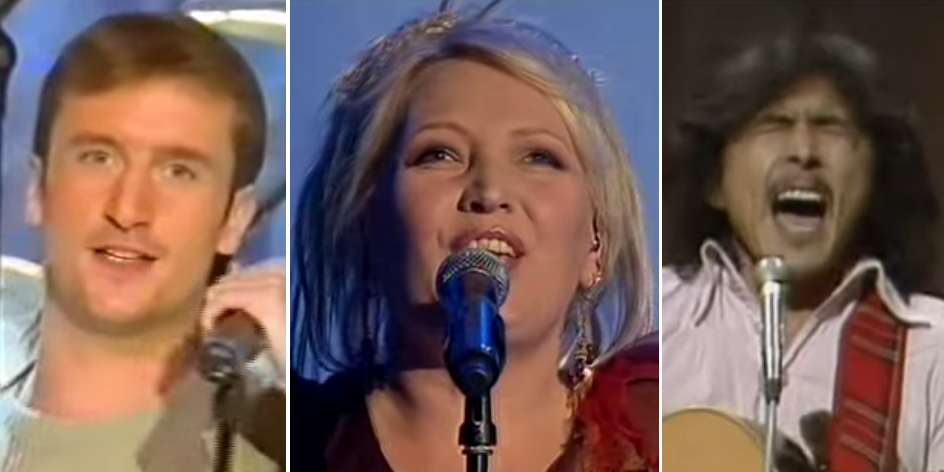
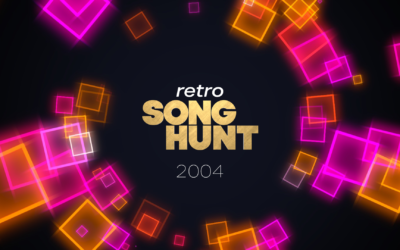
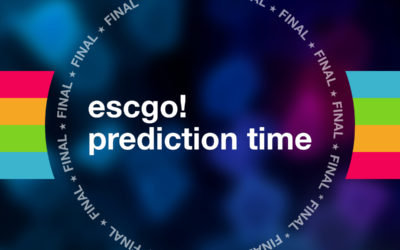
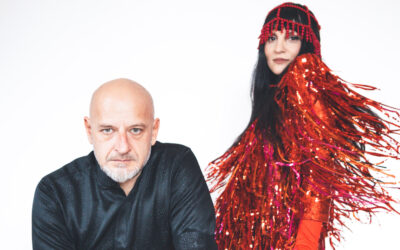

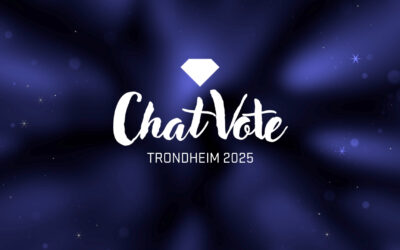
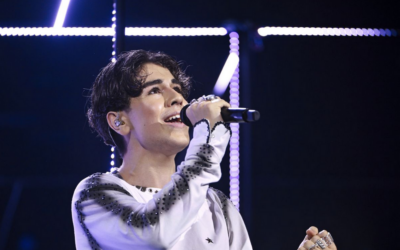
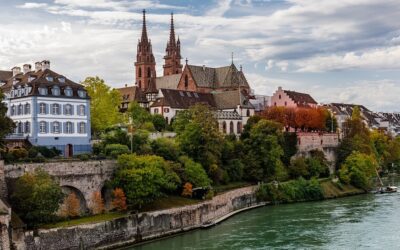
0 Comments